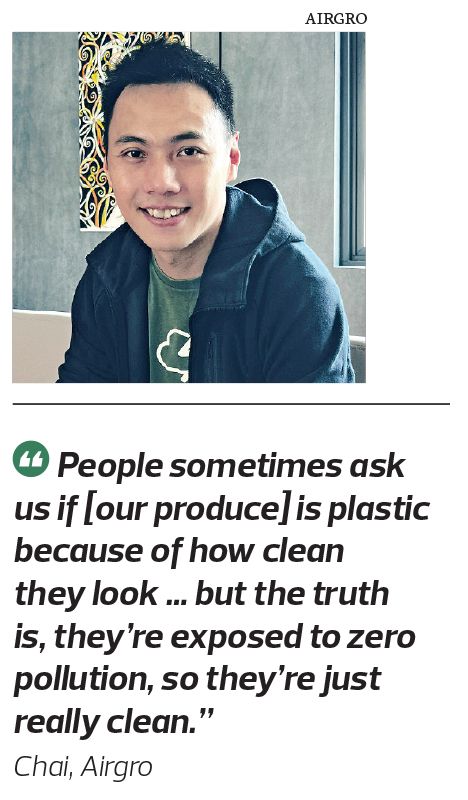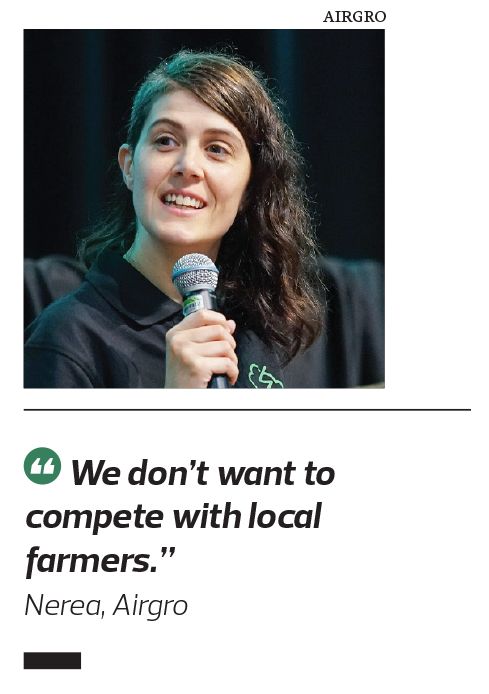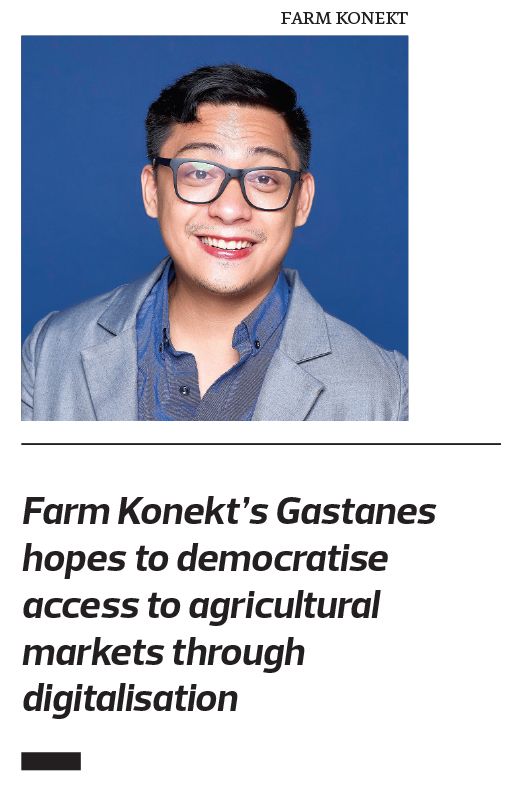
This article first appeared in Digital Edge, The Edge Malaysia Weekly on January 13, 2025 - January 19, 2025
Traditionally, plants rely on water, soil and sunlight to thrive. But local start-up Airgro Sdn Bhd is exploring a cutting-edge approach to farming: growing crops out of thin air.
To tackle the needs of a growing population and Sarawak’s rising reliance on imports, Airgro — founded by Kenneth Chai, Nerea Arnal and Amirrasdan Ibrahim — wants to improve food production through resource efficiency, waste reduction and cost optimisation.
“Our company was started in 2020 during the Covid lockdown. As Sarawak is on an island, we were out of imported vegetables, both from Peninsular Malaysia and globally,” says Chai, Airgro’s CEO.
Airgro’s incubators mimic the climates of places where commonly imported vegetables grow by precisely controlling temperature and humidity, enabling the growth of non-native plants such as herbs, leafy greens and berries, among others.
Aigro’s technology eliminates the need for soil and nurtures plant growth using key components of air — primarily nitrogen, which constitutes 78% of the atmosphere, and water vapour, a smaller but increasingly significant element as global warming accelerates.
It achieves this by using electricity to break down nitrogen (N) in the air into nitrates (NO3-), mimicking the natural process of lightning in the nitrogen cycle.
These extracted components are then integrated into an atomised cloud, creating an environment where foreign crops can be farmed sustainably, efficiently and locally within a fully automated, climate-controlled system. Airgro can even adjust growth rates by shortening 24-hour cycles to just 22 hours.
To ensure each plant grows as healthily as it would in its natural habitat, additional nutrients specific to each species are manually introduced. Airgro’s groCaps, for example, contain pre-infused nutrients, accelerating seed germination.
“In Malaysia, about 80% of nitrogen fertiliser production relies on natural gas as its primary raw material and energy source. Adding to this, the transport of goods from China — our largest trading partner — generates significant carbon emissions, averaging 35kg of carbon dioxide per shipment by sea and 117kg by air,” says Chai.
Airgro’s approach eliminates these environmental costs by operating without conventional pesticides, fertilisers or soil. Instead, it relies solely on electricity and pure water extracted from the air. While electricity is not an inexpensive resource, its cost decreases over time as the system becomes more efficient with repeated use.
“We don’t want to compete with local farmers,” says Nerea, co-founder and chief technology officer of Airgro, during the 2024 Malaysian International Food and Beverage (MIFB) Strategic Conference.
Airgro’s products have two uses: as a tabletop appliance for home consumers, as well as an indoor integrated farm on a larger business scale, Chai explains. The company also provides consultation, construction, operations and maintenance for these indoor farms.
“People sometimes ask us if [our produce] is plastic because of how clean they look … but the truth is, they’re exposed to zero pollution, so they’re just really clean,” says Chai.
Their operations, albeit small, have been successful. In a 120 sq ft area, it has grown herbs, pink lettuce, swiss chards and heirloom tomatoes for a grocer in Kuching, which usually imports its produce and stores them in an air-conditioned refrigerator at a one-in-five spoilage rate.
“Airgro’s next door system ensures minimal transport and storage cost as yield is designed to match demand and consumption,” says Chai. He explains that the company’s efforts have improved wastage rates to one in 65, reducing food imports to 40% and cutting transport carbon emissions by 100%.
During the presentation at MIFB, Nerea highlighted that Malaysia imported about US$7 billion worth of vegetables in 2022, making it the 25th largest vegetable importer globally. In 2023, there was an 11% increase in imports compared with 2021.
Nurturing partnerships
Airgro’s mission to enhance Malaysia’s food security by boosting local production and reducing import dependency aligns with the broader vision of Farm Konekt, a start-up born out of necessity during the pandemic-induced import slowdown in Palawan, the Philippines.
Founded by John Vincent Gastanes, Farm Konekt began as a data collection app for farmers aimed at providing clustering solutions to optimise production.
Gastanes hopes to democratise access to agricultural markets through digitalisation, acknowledging that smallholder farmers drive much of the world’s food production. By building a comprehensive farmer database, Farm Konekt facilitates better market integration, infrastructure development and equitable profit distribution.
The platform focuses on leadership development, appointing “farmer leaders” to manage data collection for clusters of farms, thus fostering community organisation and reducing exploitation.
Farm Konekt has onboarded about 6,000 farmers in Palawan, supported by 700 farmer leaders. Despite operating with a lean team of 20, the start-up plans to expand its reach across the Philippines and the BIMP — Brunei, Indonesia, Malaysia and the Philippines — region.
This expansion coincides with its collaboration with Airgro, which was formalised through a memorandum of understanding with the Sarawak Digital Economy Corporation (SDEC) during the Malaysian Investment and Development Authority Invest Series in Sarawak on July 17, 2024.
Through this partnership, Airgro raised RM200,000 in capital and grants from co-founders, angel investors and Sarawak’s Ministry of International Trade, Industry and Investment.
Farm Konekt’s data acquisition platform will play a critical role in fine-tuning Airgro’s indoor farming systems, ensuring they meet the specific needs of local communities across the BIMP region.
“Having constant data feedback on a single platform is crucial for us to streamline our system to optimise growth rates and energy efficiency for our customers,” says Chai, adding how detailed data collection enhances Airgro’s product development.
This collaboration also supports Airgro’s plans to scale up its operations in Kuala Lumpur, including building an indoor farm to test and replicate its infrastructure at 12 times the scale by 2025.
Meanwhile, Farm Konekt aims to establish an office in Sarawak by year end, strengthening its relationship with Airgro and supporting Malaysian farmers.
Save by subscribing to us for your print and/or digital copy.
P/S: The Edge is also available on Apple's App Store and Android's Google Play.



